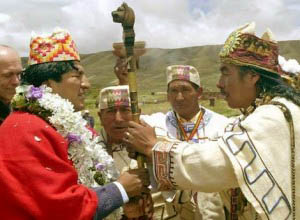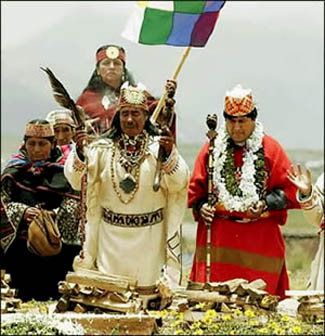 |
International Affairs
The Religious Tribalism of Evo Morales
Juan Sanahuja, Argentina
On February 2, 2009, the new Constitution of Bolivia went into effect. On that day President Evo Morales proclaimed “the birth of the Socialist and Anti-Imperialist Republic” of Bolivia.
The constitution, inspired by a Marxist Tribalism, was approved by 60% of the voters in a referendum made on January 25, 2009. Its preamble promotes the return to the Indian cults of pagan religions that existed in Bolivia previous to the discovery of America. It states:

President-elect Evo Morales in a pagan ritual |
“Since time immemorial, our mountains stood and our rivers flowed and formed our lakes. Our Amazon, our Chaco (wildlife reserve in southeastern Bolivia), our Altiplano (mountains with active volcanoes) and landscapes were covered with greenery and flora. We peopled that sacred Mother Earth with different faces and we understood the plurality of all things, beings and cultures.
"Thus our peoples lived together, never experiencing racism until we began to suffer it in those ill-fated colonial times … By a mandate of our people and with the strength of our Pachamama [Mother Earth] and God, we declare the re-foundation of Bolivia.”
These words spread an anti-Spanish phobia, which is an anti-Christian phobia.
After Morales’ inauguration in 2006, the newspaper Los Tiempos of Cochabamba wrote:
“Evo Morales received the political power of the nation with a spectacular display of religious rituals related to Pachamama (Mother Earth), the gods Inti and Achachilas and all the divinities of the native religion in the times of Collasuyo [an Inca territory south of Bolivia]. He honored Mother Earth for receiving its fruits, the sun and the high mountains for their rays and riches, and the creeks that fertilize his beloved and venerated Earth.
“The government palace became the stage for those Andean religious rituals. The performers appeared to be more Aymara Indian priests than government authorities. The government of Morales made a syncretism between the native Indian and the Catholic religions. On one day, he was the witch doctor of the milluchadas (Indian rituals to call the spirits from the dead); on another day he was leading prayers to the saints in Catholic churches.” (Los Tiempos, June 20, 2006)
Since the Catholic Hierarchy had opposed the new text of the constitution, Morales attacked the Bolivian Church at the World Social Forum held in Belém, Brazil, from January 27 to February 1, 2009. Indeed, he declared:
“There are new enemies in Bolivia. They are not just the rightist-oriented press but also groups in the Catholic Church, the hierarchy of the Catholic Church who are enemies of our peaceful reforms. … I want to tell you that just as we shout, ’Another world is possible,’ so also we will say, ‘Another faith, another religion, another church is also possible.’” (Los Tiempos, January, 30, 2009)

Morales officiating at the Indian rituals |
As he spoke these words, Morales was applauded by presidents Luis Inácio da Silva (Lula) of Brazil, Rafael Corrêa of Ecuador, Fernando Lugo of Paraguay and Hugo Chaves of Venezuela. Leonard Boff, advocate of Liberation Theology, was also present.
In their critique of the Constitution - which soon later would be approved - the Bishops warned that the text “does not recognize the deep reality of the Bolivian people, who in the great majority profess the Catholic Faith. It also ignores the historical, cultural and social importance of the Catholic Church … in forming the national identity and development.
“The part that affirms that ‘the State is independent of Religion’ (art 4) contradicts another part further down that affirms: ’The State will adopt the original native Indian cultures, which hold the deposit of [our] spiritualities and conception of the world” (art. 98). This latter text suggests the interpretation that the State will adopt only those early native Indian spiritualities.”
Further, the Bishops accuse the proposed Constitution of “not recognizing the right to life from the moment of the conception” (art. 15 § 1).
They also point out the ambiguity in its wording regarding so-called “sexual and reproductive rights,” which endanger the integrity of the family and its capacity to procreate by weakening the right of the parents to raise and educate their children. … The ambiguous statement on marriage that allows it to be made ’between a woman and a man‘ (art 63) makes it appear that this is just one way to have a marriage, opening the possibility of a marriage between persons of the same sex.”
I believe that the Bishops failed to point out that the text also favors judicial and social recognition of homosexuality when it opposes any discrimination related to “sexual orientation or genre identity” (art. 14 § 2).
TIA's note: Looking at the tribalist trends of the Marxist governments of our South American neighbors, we should be prepared to resist such bold maneuvers in our own country, which is making rapid strides on the socialist track.

Posted October 5, 2009
Juan Sanahuja first published this article in Spanish on his website
Noticias Globales
An electronic bulletin for the promotion and defense of life and family

Related Topics of Interest
 Mother Earth Day - Evo Morales' Project Mother Earth Day - Evo Morales' Project
 Liberation Ecology Liberation Ecology
 Progressivism Is Becoming Green Progressivism Is Becoming Green
 A Multi-Faceted Ecology: New Ideal for Religious Orders A Multi-Faceted Ecology: New Ideal for Religious Orders
 The Hermeneutics of Watermelons The Hermeneutics of Watermelons
 The Right Sprouts Again in Bolivia The Right Sprouts Again in Bolivia

Related Works of Interest

|
|
International Affairs | Hot Topics
| Home | Books |
CDs | Search | Contact Us | Donate

© 2002- Tradition in Action, Inc. All Rights
Reserved
|
 |
|